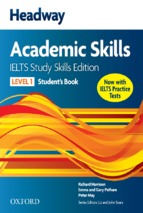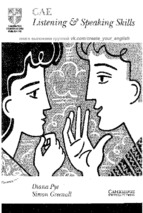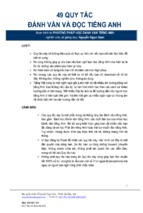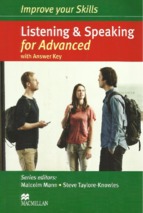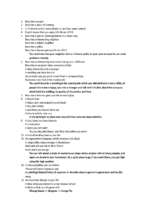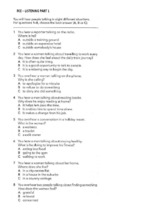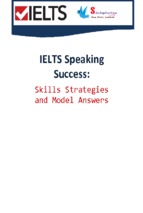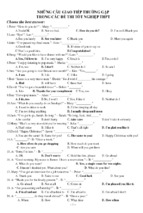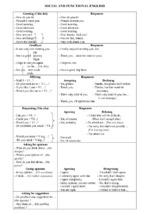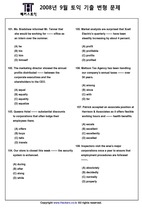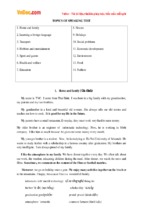Rule # 1 For Excellent English Speaking
Hi, I’m AJ Hoge, one of the teachers of Learn Real English. And welcome to our video course.
Now, let’s get started with Rule # 1 or Secret # 1. And Rule # 1 is to always learn English phrases, and to
never, never study just individual words. So in this course we’re going to teach you a totally new way to
learn English, a totally new way to study English, so that you can speak English quickly, easily,
automatically, powerfully, confidently.
So what’s the old way of learning English? You know it because you learned it in school. You’ve been
using it for years and years and years. You sit in a classroom. You’ve got a textbook. You memorize
lists of vocabulary words. You study lots and lots and lots of grammar rules. You do lots of reading and
little fake conversation drills and activities. And this is the traditional old way of learning English but we
have a totally new and different way of learning it. And we’re going to teach you each part of that, one
part every day for a full seven days.
So let’s start with Part 1, Secret 1, Rule # 1…learn phrases, not individual words. Now, of course, a
phrase is a group of words. It’s a group of words that naturally go together. This is very important. You
see, when you only study individual words, you are doing a number of things that make learning difficult.
Number one, when you study just an individual word like a vocabulary, something in a vocabulary list, or
even in your notebook you write one single word and then you write the meaning or the translation, here’s
the problem. That word has no connections to anything else. Therefore, it’s difficult for your brain to
remember it.
That’s why you have to keep repeating again and again. You look at that list and you try to memorize it.
And then the next day you forget and then you go back and you try to memorize it again and again and
again and again and again. And maybe after a very long time you might remember it. But most likely
you’re going to forget it, especially long-term. And yet that’s the way most students are learning English
and studying vocabulary.
Here’s another problem with just learning single words. When you study just single words, you’re not
learning any grammar. But when you study phrases, you are actually learning grammar. It’s kind of an
effortless, easy way to learn grammar. You don’t need to think about rules. You don’t need to think
about anything. And yet, you will be learning correct grammar when you study groups of words instead of
phrases.
Let me give you an example of this. Let’s just, y’know, take any phrase…like, um, a simple, simple
sentence. He was a bad dog. He was a bad dog. Now, let’s imagine that you’re a new English student
and the word bad is new for you. Of course, I know you know it, but let’s just imagine you go way back to
the very beginning and your first year of learning English and bad is a new word. Now the normal way of
studying that, you would write it down, bad, it would be in a little, y’know, a list. And then you would study
www.LearnRealEnglish.com
© Copyright: Learn Real English, LLC
1
Rule # 1 For Excellent English Speaking
bad means not good, bad means not good. You’d probably translate it to your own language. And then
after lots and lots and lots of time, maybe you would remember it.
Well using our system, you do something very different. You would write down that whole phrase. He
was a bad dog. That’s actually a full sentence. Or you could just write down was a bad dog or he was a
bad dog, whatever. And then every single time you study or review, you would always, always, always
study the full complete phrase. You would never just study that word, bad. You would study the whole
thing.
Now by doing that you’re getting free grammar. How do you know? Well, because first of all you’re
getting that verb, was, right? Was, and that’s just going to stick in your brain, he was, he was, he was.
You’re also learning articles. You don’t need to remember what that means. You don’t have to even
worry about it. And yet you know that it’s correct to say, in this situation, a bad dog. He was a bad dog.
Some people say a, he was a bad dog. Both pronunciations are correct. So he was a bad dog. He was
a bad dog.
A lot of students have problems. When do I use a, or a? When do I not? When do I use the? And
you’re trying to memorize all these super complicated rules and situations for it. Forget that. It’s too
complicated. You’ll never remember it. Just study phrases and you’ll start to feel when to use it, when
it’s correct, when it sounds correct and when it sounds strange, when it’s not correct to use those things.
And, of course, this is true for all grammar; all phrases; all vocabulary. By studying a full phrase or even
a full sentence, always, always, always, you’re going to get lots of grammar. You’re going to learn which
vocabulary words go together naturally. And you’re going to know when to use them in which situations.
Because sometimes, for example, there might be a situation where there are many words that mean the
same thing. And yet we typically use one of them.
Like, we might say he was a bad dog. That’s a common phrase, a bad dog, bad dog. We use that word
bad to describe a dog who’s naughty, who’s not good. But we don’t usually say horrendous. Now
horrendous means super super bad, really terrible. And yet we don’t usually say he was a horrendous
dog. It sounds strange, even though the meaning is basically correct. Yet, in normal real English, not
textbooks, but real English, we just don’t use that word to describe dogs, not usually. I don’t know why.
There’s no real rule about it. It’s just that’s what we usually do. And every language has these kind of
word combinations that are more common, and other word combinations which just aren’t used typically.
How do you learn that? Well you can’t learn it from any rules because there are no rules about that. You
have to learn it by studying phrases always. Always, always, always study phrases. Review phrases.
Whenever you learn a new word don’t just write down that individual word. Write down the full phrase, or
even better, the full sentence that it’s in. Always include the words that are around it. This is going to
help you improve your English speaking ability much, much, much faster.
www.LearnRealEnglish.com
© Copyright: Learn Real English, LLC
2
Rule # 1 For Excellent English Speaking
Even better, when you write down the phrase, also write down where the phrase came from to remind
yourself of the whole situation. So you might, let’s say you find a new word in a newspaper article. Well
first of all, let’s say the word horrendous. You’re reading a newspaper article or you’re listening to the
radio and you hear that word horrendous. Hm, that’s new, what is that? And you write it down. But
you’re not going to write down just that single word.
You’re going to write down the whole phrase that it was in. And then you’re also going to make a note,
you’re going to put down, y’know, this came from a newspaper article about the economy. And this is
going to trigger you, it’s going to remind you, give you a memory cue, a memory reminder, of the full
situation. So now you’re not only getting just this single word. You’re getting the full phrase or sentence
that it’s in and you’re also reminding yourself where that sentence came from. What was the general
topic, what was the general situation.
And in this way you’re getting a lot of extra grammar which you’re learning unconsciously, easily. You
don’t have to think about it but you’re learning it anyway. Your brain is learning it, even though you might
not know that. And you’re also learning when certain phrases and certain words are used and when
they’re not used. You’re learning which situations it’s used, or they are used in. And you’ll, of course,
know that in other situations you don’t use.
Because as you learn more and more and more phrases, you begin to get this feeling of correctness.
And you begin to know when to use certain words, how to use them, and you’re also, how to use the
grammar correctly as well.
This is so important. It’s such a simple, simple little secret, a simple little trick, a simple little rule. And yet
it can totally change the way you speak English and learn English. It’s very, very important. So never,
never, never study just an individual word, one word, always study the phrase or the sentence. And
always, always, always make a note where it came from. And you want those phrases and sentences to
come from real English, which we’ll talk about more later, not from textbooks.
Here’s another advantage of studying phrases and full sentences and always knowing the situation that
they came from. Phrasal verbs, you guys know about them. You know all about phrasal verbs that are a
frustration for so many students, right? Y’know, to be knocked out or knocked up, have totally different
meaning, right? Knocked out is a phrasal verb, it’s a two-word verb, it’s a verb phrase. And to be
knocked out means to like, it’s like in boxing or sports, you get hit and ugh, it’s like you’re asleep, right?
Boom, knocked out on the floor. To be knocked up means to become pregnant. We use that for women.
Now there’s no way if you just look at the individual words to know the meaning, right, knocked out,
knocked up. It’s not logical. You just have to learn each one individually.
www.LearnRealEnglish.com
© Copyright: Learn Real English, LLC
3
Rule # 1 For Excellent English Speaking
But if you just try to study lists and lists and lists of phrasal verbs, you’re going to become very confused.
You’ll start confusing one with the other. You’re going to forget and it’s horrible and you don’t want to do
that. It’s not effective. It doesn’t work. But if you learn those phrasal verbs from real situations, real
sentences, real articles, real audios, real speech, and then you always study them in the whole sentence.
So then you know the situation, right?
If you, if you get the whole sentence, the fighter knocked out the other fighter. And you’re always
studying that full phrase or sentence, the fighter knocked out the other fighter. You’re going to just
naturally know. Y’know, you’ve got that word fighter in there, helps you to remember the situation. And it
helps you to remember the meaning of that phrase, knocked out.
Or you could say the woman got knocked up by her boyfriend, right? So now you’re like, ah yeah,
boyfriend, it gives you…it gives you a clue. It gives you an idea of the meaning of that phrase. And you’ll
know that you always use that phrase in situations that describe pregnancy. This is much better than
studying lists and lists and lists of phrasal verbs.
So what’s our first rule, what’s our first secret? Always, always, always study phrases, groups of words.
Always write down a note about where the phrase came from to remind you of the situation. And no
more, never again, study just individual words. And that’s all. That is powerful Secret # 1, Rule # 1 for
learning to speak fantastic amazing English. Start using this rule immediately today, okay?
We’ll see you tomorrow for Rule 2. Bye-bye.
www.LearnRealEnglish.com
© Copyright: Learn Real English, LLC
4
Rule # 2 For Excellent English Speaking
Hi, I’m Joe Weiss, and I’m one of the directors of Learn Real English. And today I’m going to be teaching
you Rule Number 2 for Excellent English Speaking.
Okay, so what is Rule Number 2? Well Rule Number 2 is quite simple. Rule Number 2 is do not study
grammar rules. Do not study grammar rules. Now, I know this may be a surprise to you because your
English teachers have always told you that you must study grammar rules. In high schools or secondary
schools, in universities, in language schools, the English teachers teach grammar, and then they teach
more grammar, and then they teach even more grammar. And that is the method you have used to study
English.
So now I have a question for you. Have you been successful using that method? If you’re watching this
video then you’ve studied English before. That means you have probably studied a lot of grammar rules.
So you need to ask yourself this question. Can you speak English quickly, easily and automatically? If
the answer is no, then you need to ask why not. Why not? Because you have been studying English for
many years.
Why can’t you speak English quickly, easily and automatically? Well the answer for most people is
because they studied too much grammar. But you are not to blame for this, no. Your English teachers
are to blame for this. Because your English teachers made you study grammar. I bet you hated studying
grammar rules. But you did it because your English teachers made you study them.
Okay, so why is it bad to study grammar rules? Well, when you study grammar rules then you think
about these grammar rules. You think about the past perfect tense, the present perfect tense, the future
perfect tense, prepositions. You think about all these grammar rules before you speak. And when you
speak, you do not have a lot of time. When you’re writing, you have a lot more time. You can write
slowly. You can correct your mistakes. You can even look in a book if you need help. When you’re
writing, you have a lot of time. But when you’re speaking, you do not have a lot of time.
When you are speaking, there is no time to think about verb tenses and verb conjugations and definite
articles, indefinite articles, adverbs. There is no time to think about those grammar rules when you are
speaking. When someone asks you a question, they want you to answer that question immediately.
They don’t want to wait one minute while you’re thinking about grammar rules. No, no, no.
So that is why it is important that you not study grammar rules. When you study grammar rules, then you
think about those grammar rules before you speak. And that means that you hesitate before you speak,
and you speak much slower and you understand much slower.
Okay, so how do native speakers learn grammar then? Well, I am an English native speaker and I can
tell you that I never studied grammar rules when I was a young boy and I was learning how to speak
www.LearnRealEnglish.com
© Copyright: Learn Real English, LLC
1
Rule # 2 For Excellent English Speaking
English. When I was 3 years old and I was learning how to speak English, my mother and father never
made me study grammar rules. They didn’t do it. So I still speak English very well and I use correct
grammar. And I never studied grammar rules. Well, when I was 12 years old, I studied grammar rules in
school, but that was for writing. It was only for writing, it was not for speaking. You do not want to study
grammar rules for speaking. For writing, it’s different.
Okay, so how do native speakers learn grammar then? Well, they learn grammar through listening,
listening to correct grammar, again and again and again and again. And when you listen to this grammar
over and over again, it gets stored deeply in your brain. Then, when it is time for you to speak, you will be
able to use this grammar because you will know what correct English grammar sounds like.
Okay, so the best way to learn grammar is through input. So listening is one form of input, listening to
correct grammar over and over again. Now reading is another form of input. And you can use reading
also to learn grammar, but you won’t use it as much as listening. Most of the time you will have listening
as your main form of input. But if you do read, please do not read textbooks. You should read easy
English novels, maybe novels that a young child would read. But most of your input will come from
listening.
You will listen to correct grammar over and over again. And this is how you will learn grammar. This is
how a child or a native speaker learns grammar. And you do it quickly, easily and automatically without
memorizing any grammar rules.
Okay, so today we’re speaking about Rule Number 2. So tomorrow we will be sending you Rule
Number 3. But in Rule Number 5, I am going to tell you a powerful way for you to learn grammar. Be it
English grammar or the grammar for any other language. And this is a very simple, powerful way to learn
grammar. And I promise you, it will not involve memorizing any grammar rules. So I’m sure you’re happy
about that.
But the rule today is Rule Number 2. And Rule Number 2 is don’t study grammar rules. Do not study
grammar rules. When you study grammar rules, you think about the grammar before you speak and then
you hesitate before you speak. You speak much slower and you understand much slower. So if you
have any grammar books, throw them away. Bury them in your backyard. You can even burn them. But
if you do burn them, please be safe, okay?
Okay, so this is the end of Rule Number 2. I hope that you’re enjoying the 7 Rules to Excellent English
Speaking course.
We are really happy to have you with us. And have a great day and I’ll see you next time. Bye-bye.
www.LearnRealEnglish.com
© Copyright: Learn Real English, LLC
2
Rule # 3 For Excellent English Speaking
Hi, this is Kristin Dodds. Welcome to Rule # 3. Rule # 3 is very simple. It’s very easy and it’s very
powerful. In fact, it’s the most important rule. What is this rule? Well, Rule # 3 is the listen first rule.
What do I mean by listen first? I mean learn with your ears and not with your eyes. So learn with your
ears, not with your eyes. Listen, listen, listen. Ideally, you want to listen for six months or longer if
possible before speaking.
Listening is the key to fluency. Now why focus on listening first? Why learn with your ears and not with
your eyes? With listening you will learn grammar. You will learn vocabulary. You will understand better
and you will get faster. There is a lot of research about listening first. Listening is the most important
thing you can do.
If you learned English the way that I learned French, in middle school, high school and college, or
university, then you probably have problems speaking English, because in school you learned with your
eyes. For example, there was a focus on textbooks, on learning from textbooks. You learned how to
read English. You learned how to write English. You learned how to think about English. So that you
probably know a lot of grammar rules. You probably know more grammar rules than a native English
speaker.
That’s because native English speakers don’t learn with their eyes. They learn with their ears. A baby
doesn’t pick up a textbook and start studying grammar rules. A baby does not learn with their eyes. A
baby learns with the ears by listening. A baby learns by listening to the parents make sounds and speak
to them. A baby just listens and listens and listens, for a year, a year and a half to two years, before they
start speaking.
So how must you learn English? You must learn English by listening first. You must listen first if you
want to speak English automatically, easily, quickly and correctly. Now, there are two important things to
remember with Rule # 3. The first thing is what do you listen to. You want to make sure that you are
listening to easy English. So what do I mean by easy English? I mean that you want to be able to
understand 95% or more of the English you’re listening to without stopping or without using a dictionary.
So, for example, you might listen to a children’s program. Or you might listen to a children’s audio book.
Another book would be a children’s movie. If these are too easy, then increase the level a little bit. You
could listen to a teenager’s program. Now by teenager, I mean, in American years, teenager would 13,
14, 15, up to 19 years old. So if a children’s program or audio book is too easy, try listening to a teenager
program or audio book, teenager movie. These are all examples of things that you can listen to for easy
English.
It is okay to listen to something that’s a little bit difficult if you have the text. For example, if you’re
listening to an English lesson, as long as you have the text, that’s okay. As long as you can read along,
www.LearnRealEnglish.com
© Copyright: Learn Real English, LLC
1
Rule # 3 For Excellent English Speaking
that’s okay. Another example would be an audio article. Or a speech, as long as you have the text these
things would be okay.
Second, the second important thing I want you to remember is when do you listen. You want to listen all
the time. So get an mp3 player or get an iPod and listen, listen, listen. Listen all the time. Listen on your
way to work. Listen on your lunch break. Listen when you’re exercising. Listen on your way home from
work. Listen in the evenings or before you go to bed. Listen as much as you can.
Now Rule # 3, listen first, it’s super easy and super powerful. Focus on learning with your ears and not
with your eyes. Remember, it’s the most powerful rule.
Okay, that’s all for Rule # 3. Tomorrow you’ll receive Rule # 4 so see you later. See you next time. Bye.
www.LearnRealEnglish.com
© Copyright: Learn Real English, LLC
2
Rule # 4 For Excellent English Speaking
Hi, I’m AJ Hoge, one of the teachers of Learn Real English. Welcome to day 4 of our video course.
Secret # 4, Rule # 4 is this: learn deeply. Learn deeply. So what does that mean? Well, of course, deep,
if you think of water, like the ocean, deep means something goes down, down, down, down, down, down,
down, down, down, down, very, very far. The opposite of deep is shallow, meaning does not go down far,
it’s just a short little bit.
So what does that mean when we’re talking about learning? Well, you need to think about like your mind,
your brain. So if you learn something deeply, the idea is that it goes deep, deep, deep. It goes into your
brain very far, meaning that it’s part of you. You’ll never, never, never forget it. You totally master it. It
becomes simple and easy and automatic. That’s the idea of learn deeply.
See, you need to think about speaking English like a sport. You see, English learning, it’s not like math or
science. It’s not just something that you memorize. It’s actually a skill that you need to use, right? You
need to perform. It doesn’t matter how much you remember. What matters is can you do it when you’re
talking in a real conversation. Can you understand instantly and quickly what the other person is saying?
When they ask you questions, can you understand the question instantly and respond, answer
immediately? When you speak, can you speak easily and automatically without stopping, without
thinking, without worrying about grammar rules, without all of those problems, without feeling nervous,
right?
It doesn’t matter what you remember for a test. What matters, what’s important is what you can actually
do in a real situation. If you’re having a job interview in English, can you do it? Can you actually do it? It
doesn’t matter what happens on the test. What matters is when you’re facing that other person, how well
do you understand? How well do you speak? How relaxed do you feel? How confident are you? Right?
That’s what you want.
You want to actually be able to do it. And that’s more like a sport. And so you need to start learning
English like you’re training, like you’re preparing for a sport. And that’s why learning deeply is so
important.
Let’s imagine this. Let’s imagine, let’s say a basketball player. Now basketball players, they have to be
very, very good at the basics, the most important parts of playing basketball. That is the most important
thing. If you ever watch interviews with the really great basketball players, the top ones, they will always
say that the basic skills are the most important. Now these guys can do very advanced, amazing things.
But if you listen to these interviews, they always say that mostly what they practice are the basic skills,
the basic skill of shooting. They will practice that basic skill of shooting, shooting and shooting,
thousands and thousands and thousands of times. Even though they are already one of the best in the
www.LearnRealEnglish.com
© Copyright: Learn Real English, LLC
1
Rule # 4 For Excellent English Speaking
world, still every day they practice that basic skill again and again. Or dribbling, which is bouncing the
ball, right? And passing it, those super basic skills they continue practicing them forever.
They practice those skills thousands and thousands and thousands and thousands of times. So that they
never have to think about them, so during a game they just shoot. They don’t think about their arm and
what they do with their legs, no. It’s so automatic. They’ve practiced it so many times. It’s so deep in
their brain that they just do it. It’s totally without effort, super easy, same with passing, same with
bouncing and dribbling.
Well that’s what you need to do with English. You need to have that same feeling that when you speak,
there’s no effort, there’s no thinking. It just comes out easily and automatically. And the only way you do
that is by focusing on deep learning. It means you totally master something. See, this is the problem in
school. In school, teachers and schools are always trying to make you go faster, faster, faster, more,
more, more, more.
You never learn anything deeply, right? They’ll teach you the past tense, for example. And maybe you’ll
practice it two, three, four weeks. And then take a test. And then you go to the next chapter and they
teach you, y’know, the past progressive or, y’know, the present perfect, or some other verb tense. And
you study that one for a few weeks. And then they teach you another one, and then another one, and
another one.
But you never really learn the past tense deeply. And so you’re getting all these verb tenses and all this
grammar and this vocabulary, but you never learn any of it deeply so that you can use it automatically
without thinking. It’s always more, more, more, faster, faster, faster. That is the opposite of deep
learning.
What you need to do is slow down and repeat more. Repetition is the mother of skill, that’s a Tony
Robbins quote and I love it. It means if you really want to be skillful at something, you really want to be
able to do something well, you have to repeat it many, many, many times. That means, for example, with
the past tense, you need to hear that thousands upon thousands and thousands and thousands of times
correctly so that it goes so deep inside you that you just feel it. You know when it’s correct. You know
how to use it and you never have to think of it.
Of course, when I speak English and use the past tense, I never think about grammar rules at all, or any
verb tense. I don’t think about them, because I’ve heard them so many times. And especially when I was
a child nobody forced me to study advanced grammar rules. Nobody confused me with that. Instead I
listened to lots of simple language, lots of simple basic language, basic sentences, basic grammar, from
my family for several years. And I didn’t learn that advanced stuff until much later, until I had totally
mastered the basics.
www.LearnRealEnglish.com
© Copyright: Learn Real English, LLC
2
Rule # 4 For Excellent English Speaking
So that’s what you need to do, too. You need to really start focusing on repeating more. So that means
that when you have a lesson, for example, let’s say you’re using one of our lessons. Instead of just
studying it a couple of days and then going to the next one, and then study that one a few days, and then
going to the next one, and trying to go very fast, you’ll do the opposite. You’ll take one lesson set. You’ll
listen to it every day for one week or two weeks, maybe even longer.
You will keep listening to it every single day, maybe one hour a day, until you totally know it deeply inside
and you can use it easily. So that when you’re listening to that lesson you understand all of it instantly.
No thought, nothing, it’s super easy. And then you’ll still listen a few more days. And that’s how you will
get deep inside of you so that you can stop translating and stop thinking and just use English
automatically, effortlessly.
So learn deeply means repeat everything a lot, many, many, many times. So you want every audio that
you listen to, every lesson set from us that you listen to. You want to listen to it for at least seven days
and two weeks is even better, every single day for 14 days, or every single day for seven days, between
that amount of time. So that at the end of that you totally and completely know it very well.
And in every one of our lessons, we’re going to repeat the basics, the most important parts of the
language again and again and again. So when you go to the next lesson, you’re still going to get a lot of
repetition. And when you go to the next one, you’ll get a lot of repetition. And in this way we train you,
we teach you to not only know English for a test, but to actually use it correctly and easily every time.
And that’s what you really want.
And that’s it. That is Rule # 4: learn deeply. Alright, we’ll see you again tomorrow. Have a great day.
Bye-bye.
www.LearnRealEnglish.com
© Copyright: Learn Real English, LLC
3
Rule # 5 For Excellent English Speaking
Hi, I’m Joe Weiss, one of the directors of Learn Real English. And today you are going to be learning
Rule Number 5 for Excellent English Speaking. But before I talk about Rule Number 5, I want you to think
back a couple of days to Rule Number 2.
Rule Number 2 is do not study grammar rules. When you study grammar rules, then you think about that
grammar before you speak, and that causes you to hesitate. And you speak much slower and you
understand much slower. So since you learned Rule Number 2, you may have wondered, “Hmm, how
am I going to learn to speak English with correct grammar if I do not learn grammar rules?” Well, that’s
what I am going to be teaching you today.
Okay, so how do we do it? Well, there is a simple, powerful technique. And there is research that shows
that this technique is the best way to learn grammar, the best way to learn English grammar or grammar
for any language. Okay, so what is this technique? Well the technique is called point of view stories, or
sometimes it’s even called point of view mini-stories. Mini means small, so a mini-story is just a short
story.
So Rule Number 5 is use point of view stories. Okay, so now that I’ve told you what the technique is, how
do we use this technique? How do we use point of view stories? Well, first I tell you a story, a mini-story.
Then, second I tell you the same story but this time I change the point of view of the story. So you may
be wondering, what does it mean to change the point of view of the story? Well, one way to change the
point of view of the story is to change the time that the story occurs.
So in the first story, I may tell you that story in the present. Then, in the second story, I tell you the same
story in the past. So that is how I change the point of view. Another way to change the point of view is to
change the person who is actually telling the story or narrating the story. Now, I’ll give you an example of
that later in this video. But one important thing to remember is each time that you change the point of
view of the story, you change the grammar in the story. So each time I tell you the story, I tell you the
same story but you hear different grammar.
Okay, so now that I’ve told you how to use this technique, I think it’s a good idea that we practice. So
let’s practice this technique. So I will tell you a story in the present, right now. Okay, let’s start.
There is a man and his name is John. And John goes to the store and John buys a shirt, and the
shirt is blue. And John pays $20 for the shirt.
Okay, so that is our first story, told in the present. Now your job is easy. You just listen to this story;
listen, listen, and you just try to understand what is happening in the story. And you listen many times,
because we want this information to be stored deeply in your memory. Okay, so how do we use these
www.LearnRealEnglish.com
© Copyright: Learn Real English, LLC
1
Rule # 5 For Excellent English Speaking
stories to learn grammar? Well, now I’m going to tell you the story again. Same story, but this time I’m
going to tell you the story in the past. So let’s start the story.
One year ago, there was a man and his name was John. Now John went to the store and John
bought a shirt, and the shirt was blue. And John paid $20 for the shirt.
Okay, so that is the end of the story that I’m telling the second time, in the past this time. Now I want to
tell you that this is just a very simple and short example. Now if you get any of our video lessons or our
audio lessons, or if you come to our live event, like one of our seminars, the stories are much longer. And
they’re much more difficult. But in this easy example, we have just heard the story two times. We heard
the same story, but one time we heard it in the past and one time we heard it in the present. So now you
would listen to this story, listen many, many times.
And when you listen, do not think about grammar. Do not think about what verb tense I’m using. Do not
think about whether I’m using irregular verb form, no. Do not think about that. When you listen, you
simply listen and you try to understand the story. That’s all you need to do. That’s why this method is so
easy, yet so powerful. You hear these different stories and you hear them many times. You hear the
same story with different grammar. And soon this grammar becomes deeply stored in your brain. And
when you speak, you will be able to use this grammar.
Okay, let’s continue practicing this method. Now I am going to tell you this story in the future. So let’s
start the story.
One year from now, in the future, there will be a man and his name is going to be John. Now John
is going to go to the store and John is going to buy a shirt, and the shirt will be blue. And John is
going to pay $20 for the shirt.
Okay, so now we have heard the same story three different ways. We have heard it in the past, the
present and the future. Now you notice this is the same story but the words in each story are different as
we change the point of view. So once again, you would listen to this story many, many times. You would
not think about grammar at all. You would just listen and try and understand the story.
Okay, now I would like to continue practicing this technique. I want to tell you one more story. This time
I’m going to change the point of view of the story so that John, the character in our story, is telling the
story. Let’s start the story.
I am a man and my name is John. I went to the store and I bought a shirt. The shirt was blue, and
I paid $20 for the shirt.
www.LearnRealEnglish.com
© Copyright: Learn Real English, LLC
2
Rule # 5 For Excellent English Speaking
Okay, so that is the end of our fourth story. The same story that we have heard each time, but the fourth
time I am telling you this story. You can hear how the words in the story change, but the story stays the
same. So this is a very powerful way for you to learn grammar. You will listen to this story again and
again. And you will not think about grammar.
You will simply listen and try to understand what is happening in the story, that’s why this is such a
simple, powerful way for you to learn grammar. You hear correct grammar many, many times, and it is
stored deeply in your brain. Then, when you speak English, you are able to use this correct grammar.
And you will be able to speak quickly, easily and confidently. And your friends and coworkers will notice
that your English has become stronger and that you speak more confidently.
When you use English using point of view stories, you learn English just like a native speaker would. You
learn like a child would learn, by listening, listening, listening.
Okay, so Rule Number 5 is use point of view stories. They are a powerful, easy way to learn grammar
without memorizing boring grammar rules.
Okay, so this is the end of Rule Number 5. I hope you’ve enjoyed it and I look forward to seeing you
soon.
www.LearnRealEnglish.com
© Copyright: Learn Real English, LLC
3
Rule # 6 For Excellent English Speaking
Hi, this is Kristin Dodds, and I’m going to talk to you today about Rule # 6. Now Rule # 6 is a simple rule
and it’s a fun rule. Rule # 6 will help you to learn idioms and slang. Rule # 6 will help you to speak
excellent English. So what is Rule # 6?
Rule # 6 is use real English materials. Don’t use textbooks. Don’t use textbook CDs. In fact, burn your
textbooks and burn your textbook CDs. Use real English materials. Now, how can you learn English
using real English materials? By getting real materials that native English speakers would use. I’m going
to discuss two examples of real English materials.
The first example are reading materials. Reading is a good choice if you like to read. Reading is great
for learning English. Don’t read textbooks. Find materials that are easy enough to understand when
you’re reading. And find materials that are fun and that interest you. So you might have to start out with
children’s books. Or, if children’s books are too easy, you could try comic books. And if comic books are
too easy, or maybe they don’t interest you, you could try teenager books. And by teenager, I mean, in
America teenager is a young adult from the age of 13 to 19. And eventually you will advance to the level
of being able to read magazines, or newspapers, or novels, or articles on the internet
The second example of real English materials are listening materials. Now listening is a great choice
because listening should be 80% of English learning. Don’t listen to textbook CDs though. Don’t listen to
people acting out a dialog as if they’re talking in a real conversation. Find materials that are easy enough
to listen to. And by this, I mean that you should be able to understand at least 95% of what you’re
listening to, without pausing, and without looking in a dictionary.
So also find materials that are fun and find materials that interest you. So you may need to start with
children’s TV programs, or maybe children’s movies, or children’s audio books. Now I mentioned audio
books in Rule #3 but I didn’t explain what they are. Audio books are simply a book that someone is
reading and while they’re reading it, they’re recording it, so that you can then listen. Now if children’s TV
programs or children’s movies or children’s audio books are too easy, then try teenager TV programs, or
teenage movies, or teenage audio books. And then eventually, if you’re not already there, you’ll advance
to the level of being able to listen to podcasts, or the news, or TV programs, adult TV programs, or adult
movies, or adult audio books.
Now why not learn English by reading an English textbook or by listening to a textbook CD? Because
these materials are not real, they’re not normal English. Textbooks teach formal English or written
English. The vocabulary and the style are for writing. Textbook CDs have people who are acting out
conversations. They’re not speaking naturally.
www.LearnRealEnglish.com
© Copyright: Learn Real English, LLC
1
Rule # 6 For Excellent English Speaking
So for Rule # 6, remember, use real English materials. Find real English reading materials that are fun,
interesting, and easy enough to understand. Find real English listening materials that are also fun, and
easy, easy enough to understand and are also interesting.
Rule # 6 is simple, and it’s fun. Use real English materials. No more boring textbooks. No more boring
textbook CDs, real English materials.
Okay, that’s all for Rule # 6. Tomorrow you’ll get Rule # 7. See you later. Bye-bye.
www.LearnRealEnglish.com
© Copyright: Learn Real English, LLC
2
Rule # 7 For Excellent English Speaking
Hi, I’m AJ Hoge, one of the teachers of Learn Real English. And today is your last day, the last secret,
the last rule. And we saved the best one for last. The last rule, the last secret is to use listen and answer
stories. And learn how to think in English. See the problem in schools, one of the problems, one of the
many problems with English education is that most students learn English through translation. Right?
You learned English, probably from a teacher who spoke your own language. So when you were
studying English you were always translating to your language from your language. When you studied
vocabulary you would memorize the meaning in your language, translation. You also learn lots and lots
and lots and lots of grammar rules. And so that makes you think all the time about English, when you’re
supposed to be speaking, when you should be speaking easily without thinking, instead you’re thinking
about grammar, you’re thinking about vocabulary. You’re also feeling nervous. All of these things are
happening and that’s why your speaking is not so great right now.
But we’ve given you 6 rules already and now I’m giving you number 7 to give you a totally new way to
learn so that you can teach yourself again, teach yourself English again. And in this way, by following all
of these rules, you will learn to speak in a very, effortless way, without thinking. You will learn to think in
English so that the thought comes to you in English and then it comes out of your mouth in English.
When someone speaks to you, you just know the meaning. You don’t have to translate to your language
and back again.
And the most powerful way to do this is to use listen and answer stories. This is really the center part of
our system, the most powerful part. It’s essential. It’s so, so, so important. So what are they? What is a
listen and answer story? Well, this is a very, very special way of teaching English. So what happens is
the teacher asks a story in a very special and specific way. And when the teacher uses this method and
this technique it trains you, it teaches you and teaches your brain to begin thinking in English. It also
teaches you to understand faster, faster, faster and faster, and to respond, to speak faster and faster and
faster without translating, without thinking about anything.
So how does that work? You probably noticed I said the teacher asks a story, not the teacher tells a
story. So the important part of this technique and this method is the teacher will tell a funny, crazy story.
And we make them funny and crazy because they’re easier to remember. See, if we tell you a normal,
boring story, you’d probably forget it. But if we tell you a story that’s funny and crazy and strange, you’ll
remember the story. You will also remember the grammar and vocabulary in that story. That’s why we
make them funny and strange and crazy.
The other thing that we do is that we ask the story, meaning we create a story using lots and lots and lots
of simple, easy questions. You see, if we just tell you a story, it’s passive. You just sit there and you
listen and you don’t do anything. Hm-hm-mm, you’re listening to the story. But if we ask you questions
www.LearnRealEnglish.com
© Copyright: Learn Real English, LLC
1
Rule # 7 For Excellent English Speaking
and questions and questions, you have to do something. Your brain has to understand the question and
then answer it immediately, because we ask these questions fairly fast.
Now the good news is they’re very simple, easy questions. That’s also important. You see, if we asked
you difficult questions, again, you’re going to stop and think. And that will teach you to understand more
slowly and to speak more slowly. We don’t want that. Instead, by using really, really, easy, simple
questions, we teach you to instantly understand. They’re simple and easy so you will understand them
quickly. And, then, you don’t have to think about the answer. It’s so obvious. It’s so easy, that you can
just say it immediately, very fast.
That is so important because that trains you. It teaches you to respond instantly. This is how we’re going
to make your brain understand and use English faster and faster and faster and faster. And that’s how
you learn to start thinking in English. And you stop thinking in your own language. Instead, you think in
English. You understand English instantly and you speak it instantly.
So what happens is the teacher just asks you a bunch of questions, y’know. What was there? You’re like
I don’t know. And we’ll say there was a boy. Ah. Was there a boy? Then you say yes there was a boy.
Say, that’s right, yes there was a boy. Was there a boy or was there a girl? And you say there was a
boy. And we just continue telling the story and it becomes stranger and more difficult. But we just keep
asking lots and lots and lots and lots of these questions.
And you, your job, is just to shout the answer. You use your body. You use your voice. You use a loud
voice. You want to teach yourself to be confident and happy while speaking English. And that’s it. By
asking lots and lots of questions, we start repeating the important grammar, many, many, many, many,
many times. We repeat the important vocabulary many, many, many, many, many times. You don’t have
to study anything. There’s no lists for you to read. You just answer the simple questions. That’s all.
And you enjoy this funny, crazy story. I mean they’re fun, they’re funny. It’s not like studying something
boring or terrible. It’s a funny, entertaining story. And by doing this, constantly, we ask, ask, ask
questions, you answer them, answer them, answer them, just shouting them out loud as you listen on
your iPod or you listen on your computer. You train yourself to think in English, understand instantly,
speak very quickly.
It’s so powerful. This is the most powerful part of our system. So Rule # 7, the most powerful rule, use
listen and answer stories. Train yourself to think in English. And that is our last rule. Congratulations,
you did it. You have finished our video course.
So what’s next? Well, you have two choices. Choice # 1: You can use all of the rules we have taught
you. And you can create your own independent study plan. And this is powerful and effective. It means
you have to go out there. Maybe you have to find your own private teacher to create some listen and
www.LearnRealEnglish.com
© Copyright: Learn Real English, LLC
2
Rule # 7 For Excellent English Speaking
answer stories for you. And you have to find some of your own materials, but you can do it. You put
them all together in your own independent learning plan using these 7 rules, and by doing this every
single day you will improve. I promise you, you’re going to improve and you’re going to improve quickly.
Choice # 2: You can buy our lessons today, our Learn Real English lessons. Now our Learn Real English
lessons use all of the 7 rules. We created these lessons because they’re convenient. It’s an easy and
convenient way for you to use all of the 7 rules. You don’t have to go find a teacher and tell them about
these rules. You don’t have to go and try to look for lots of different materials. Everything you need we
give you immediately.
So if you’re interested in that, and I recommend it highly, just go to our homepage, learnrealenglish.com,
and then go to the bottom. You can read about it. You’ll learn something about our lessons. Then go to
the bottom and click the big button that says Order Now or Buy Now. And you will immediately start.
See, our lessons are digital, meaning after you buy them, you can download them to your computer right
now. So you can get started today using all of these 7 rules and start improving your English right now.
We look forward to having you as one of our students. When you become one of our students, when you
get our lessons, you can join our social website. And you can ask questions. You can meet other
students from around the world. It’s a fantastic group, very positive group of people, very, very friendly.
And they will support you. They’ll answer your questions. They’ll help you. If you’re feeling discouraged,
they will encourage you and give you lots of positive energy. So it’s really a fantastic group.
So I hope you join us today. Get our lessons. Go to our homepage. And I will see you again soon.
Have a great day. Bye-bye.
www.LearnRealEnglish.com
© Copyright: Learn Real English, LLC
3
- Xem thêm -






